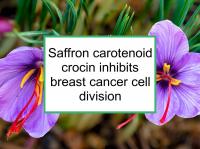Saffron, a spice made of the dried stigmas of the Crocus sativus flower, incorporates anti-cancer compounds such as the carotenoids crocin, crocetin, and safranal (a derivative of zeaxanthin). Now a new study has reported that crocin reduces both ER+/PR+ and triple negative (ER-/PR-/HER2-) breast cancer cell proliferation.
Saffron has been reported to reduce biomarkers of angiogenesis (the growth of new blood vessels) in ER+/PR+ breast cancer cells. In addition, saffron has been shown to protect against doxorubicin-induced heart damage without reducing the effectiveness of this treatment. Crocin can significantly inhibit the proliferation of ER+/PR+ cells and induce their apoptosis (programmed cell death).
Crocin has also been shown to suppress tumor growth and protect against carcinogen-induced breast cancer in rat models of breast cancer. In addition, crocin has been shown to enhance the treatment effects of both radiotherapy and paclitaxel chemotherapy. Note that there is some evidence that saffron could be toxic at very high doses—saffron should be consumed as a spice and not in the form of saffron tablets.
Latest research finds crocin interferes with cell division
The study referenced at the beginning of this news story was designed to investigate the mechanism of action by which crocin inhibits the proliferation of various cancer cells (including ER+/PR+ and triple negative cells). The authors demonstrated that crocin inhibited the proliferation of the cells by targeting microtubules (which help pull a cell apart when it divides). Crocin degraded the microtubules, interfering with spindle formation and inhibiting mitosis (cell division). Further investigation using an electron microscope provided more detailed information on how crocin inhibited microtubule assembly.
The authors conclude that crocin inhibits proliferation primarily by disrupting the microtubule network.
Please see our saffron webpage for more information.
